- Home
- Dan Gutman
Jim & Me Page 7
Jim & Me Read online
Page 7
McGraw finally backed away, and it almost looked like the hint of a smile flashed across his face.
“Boys,” he said, “I just signed a new outfielder. I want you to meet him.”
McGraw went back into his office and came out with a stocky guy with dark skin. In fact, his skin was so dark that he looked African American to me. But I knew that was impossible. Black players were barred from playing professional baseball until Jackie Robinson broke the color barrier in 1947.
“Afternoon, gents,” the guy said, giving a little wave.
“This is Chief Tokahoma,” McGraw announced, glancing in Jim’s direction. “He’s a full-blooded Cherokee. The Chief is gonna take us all the way to the Series this year. It’s about time I found an Indian who can play this game.”
“But Mr. McGraw, I ain’t no Indian,” Chief Tokahoma said. “I’m a Negro. My name’s Charley Grant.”
“I know you’re a Negro!” McGraw shouted. “But Negroes ain’t allowed to play, so from now on you’re a Cherokee. And your name is Chief Tokahoma. You got that?”
“Yes, sir.”
I looked over at Jim. His eyes were almost bugging out of his head, like he couldn’t believe what he was hearing.
“Wait a minute,” he said. “You’re gonna pretend this guy is an Indian so he can play, but meanwhile I’m a real Indian and you won’t let me play?”
“That’s right, Thorpe,” McGraw said. “And you know why?”
“Why?” Jim asked.
“Because Chief Tokahoma here can hit a curveball.”
“That’s it,” Jim shouted. “I quit!”
“Good!” McGraw said. “If you quit, I don’t have to pay you to sit on the bench for three years.”
“I hope you finish in last place!” Jim yelled, as he grabbed a shirt out of his locker. He was still buttoning it when he stormed out the door and slammed it behind him.
It was quiet for a few seconds. John McGraw shook his head and massaged his temples with two fingers.
“He’ll be back,” he said. “They all come back. And we’ll finish in first place…if my brains hold out.”
13
No Fighting
AFTER JIM STORMED OUT OF THE LOCKER ROOM, JOHN McGraw strolled back to his office as if nothing had happened. The players went back to preparing for the day’s game.
I looked at Bobby and he looked at me. We both felt sorry for Jim, but there was nothing we could do for him now. There was no reason to stay in 1913 either.
But then again, there was no reason we had to get home right away.
“Let’s blow this pop stand,” Bobby said, jerking his head toward the door.
There were lots of twists and turns in the tunnels under the Polo Grounds. It was amazing that we ever found our way out of the place. Eventually we discovered a door that led to the street. By that time, Jim Thorpe was long gone.
“How are we gonna find him?” I asked Bobby. The street was full of people rushing in all directions.
“I have a hunch I know where Jim’s heading,” he said, and we took off down Eighth Avenue.
I had been to New York before. I visited Babe Ruth there in 1932 and Jackie Robinson in 1947. But this was decades earlier. It looked like a completely different city.
There was a skyline in the distance, but it was kind of wimpy, if you ask me. The Empire State Building didn’t exist yet. Most of the “skyscrapers” were less than ten stories high.
Without tall buildings, you could actually see the sky, and there were no planes flying around. The Wright brothers had only gotten off the ground a few years earlier. There were cars in the street, but there were also a lot of horse-drawn buggies. You had to be careful with every step you took, because where there are horses, there’s horse manure.
“This is my kinda place!” Bobby said.
Bobby acted like he knew where he was going, so I followed him. The street was a buzz of activity. Men with straw hats and mustaches were everywhere. It was like that was their uniform. Women wore huge floppy hats with flowers on top. Restaurants advertised dinner for 15 cents. There were pushcarts selling all kinds of stuff. I saw a guy lifting a big block of ice out of a truck and rolling it up somebody’s front steps. I guess people didn’t even have refrigerators yet.
There were lots of movie theaters, showing films like The Last Days of Pompeii and Dr. Jekyll and Mr. Hyde. I wondered if they were silent movies. There were live theaters too, and each one featured an assortment of sword swallowers, fire breathers, glass eaters, and other weird acts: The Amazing Tomsoni and His Trick Bicyclists. The Duncan Twins. Buck and Bubbles.
“This is my kinda place!” Bobby said.
We had walked a couple of blocks when Bobby pulled me into a doorway with a sign over it that said EIGHTH AVENUE SALOON.
“Wait!” I said, stopping at the door. “This is a bar!”
“Duh!”
“Kids aren’t allowed in bars,” I protested.
“Will you relax, Stoshack?” Bobby said. “It’s okay as long as we don’t drink. My parents took me to Las Vegas once, and kids were allowed in the casino as long as they didn’t gamble. Same thing. Just look like you belong.”
He was right. Nobody paid any attention to us at all.
There was sawdust on the floor, and a big sign that said NO FIGHTING! I noticed an autographed picture of Jim Thorpe on the wall, and photos of the other Giants too.
“Look!” Bobby said. “There he is.”
Jim was at the bar with a drink in his hand and two empty glasses in front of him. Three guys wearing bowler hats surrounded him. We muscled our way over until we were close enough to hear them.
“So what did you say when the king of Sweden put that gold medal around your neck?” one of the guys asked Jim.
“Thanks, King!” Jim said, and the three guys roared with laughter. Jim leaned his head back and downed the drink. One of the guys signaled to the bartender to bring Jim another one. He did, and then said he had to get a new bottle from the cellar. It looked like Jim was a regular in this place.
“He’s drinking like a fish!” I told Bobby.
Jim had started telling a story about the Olympics, when some other guy staggered over to the group. He was a big guy, and he wasn’t dressed nicely like the other three. He had on an undershirt that showed off his muscles.
“Ain’t you Jim Thorpe?” the guy asked.
“So they say,” Jim said, taking a swig of his drink.
“I hear you’re one tough Indian,” the guy said.
“They say that too.”
“Well, you don’t look so tough to me.”
“Maybe not,” Jim said, turning to get a good look at the guy.
“You know how to box?” the guy asked.
“A little,” Jim replied, turning back to the bar.
“I bet I could knock you down.”
A hush fell over the bar as Jim turned to look the guy over again. Then he reached into his pocket and pulled out a hundred-dollar bill. Somebody gasped. A hundred must have been like a fortune in 1913.
“Tell you what,” Jim said, slapping the bill on the bar. “I’ll give you one punch. If you knock me down, you keep this hundred.”
Jim was slurring his words. There was no way he should be making bets when he was drunk. I felt like I should do something, but I didn’t know what.
“I’ll take that bet,” the guy said, pumping a fist into his hand.
“But if you don’t knock me down,” Jim continued, “I get your hundred and a punch of my own.”
“I ain’t got no hundred,” the guy said.
Everybody at the bar rushed to pull bills out of their wallets. One of the guys counted up the money. When he reached a hundred dollars, he put the bills on top of Jim’s hundred-dollar bill.
“Okay,” Jim said, as he got off the barstool and clasped his hands behind his back. “Your turn.”
Then the guy with the muscles smiled and made a big show out of rolling his shoulders. Everybo
dy stopped what they were doing.
The guy reared back and walloped Jim right in the stomach, really hard. His fist made a sound like a fastball slamming into a catcher’s mitt.
A punch like that would have knocked me back at least ten feet. It would have put me in the hospital, for sure.
Jim grimaced a little and just stood there. Then he smiled. All the guys in the bar started whispering to each other.
“Okay,” Jim said. “My turn.”
Without any warmup, Jim socked the guy in the jaw.
The guy’s head turned with the punch. He fell backward and hit the floor like a sack of potatoes. His eyes were shut. He wasn’t going to be bothering anybody for a long time.
I’ll tell you, if the cell phone had been invented, every one of those guys in the bar would have been calling his friends to tell them what happened. They were all yelling and offering toasts and clapping Jim on the back. He calmly picked up the bills off the bar and stuffed them in his pocket.
That was when the bartender came back up from the cellar. He had a bottle in one hand, and a gun in the other.
“What’s goin’ on?” he asked, looking at the guy on the floor. “There’s no fighting in this saloon.”
“Jimmy just taught that fella a lesson,” one of the guys in a bowler hat said.
“You’ve had enough,” the bartender said to Jim. “I’m gonna have to ask you to leave…again.”
“Just one more drink,” Jim said, “and I’ll be on my way.”
“Do you know who you’re talking to?” another guy asked the bartender. “That’s Jim Thorpe, the Olympic champion!”
“I know who he is,” replied the bartender, pointing the gun at Jim. “I don’t care if he’s Woodrow Wilson. No fighting in this bar.”
“There was no fight!” yelled Bobby. “Jim just punched that guy’s lights out.”
Everybody turned to look at Bobby. Even Jim.
“Who are you?” asked the bartender.
“I’m Jim Thorpe’s great-grandson,” Bobby said, which were probably the stupidest words anyone in the world has ever uttered. Some of the guys at the bar laughed. Jim wasn’t even thirty years old.
“Well, you better get Grandpa outta here by the time I count to five, or he’s gonna have a hole in his head big enough to put a baseball through,” the bartender said. “One…two…”
Jim wasn’t making any move to leave.
“You think I’m kidding? Three…four…five.”
14
On the Sidewalks of New York
ME AND BOBBY GRABBED JIM BY HIS SHOULDERS AND hustled him to the door. We had to hold him up. He was so drunk I was afraid he was going to fall over.
“Come on,” Bobby told Jim once we were out on the street. “We’ll help you get home.”
“I didn’t know I had a great-grandson,” Jim muttered. “I’m not even married yet.”
“We live in the twenty-first century,” Bobby explained. “My friend Stosh here can travel through time…with baseball cards.”
Jim looked at us funny, like he was trying to focus his eyes.
“Here, I can prove it,” Bobby said, pulling the iPod out of his backpack. “Stick these things in your ears.”
“What are they?” Jim asked.
“Earbuds.”
Jim stuck them in his ears and Bobby turned on the iPod. Jim instantly let out a scream and fell to the sidewalk, ripping the earbuds out.
“Turn it down!” I told Bobby.
“It was in my head!” Jim yelled. “The sound was in my head! What was that?”
“Heavy metal,” Bobby told him
After Jim had recovered, he got up and examined the iPod carefully. It was like he couldn’t believe that such a little thing could make such a big noise.
“Can I hear that again?” he asked.
Bobby gave him the earbuds and turned the iPod on again, lowering the volume this time.
“Pretty cool, huh?” Bobby asked.
Jim didn’t hear him. He was bobbing his head up and down with the music.
“This is good,” Jim said when the song ended. “Twenty-first century, huh?”
Jim must have liked the iPod, because he put an arm around each of us, and we all started walking down Eighth Avenue together. I think the blast of music sobered him up a little.
“Hey, what’s the deal with John McGraw?” I asked, stepping over some horse manure in the street. “He is one bad guy.”
“There’s an old Indian saying,” Jim said. “Bad in good, and good in bad.”
“How come he hates you so much?” asked Bobby.
“I like to win,” Jim said, “but with McGraw, nothing else matters. Nothing. Winning is his whole life. I like to compete; if I don’t win all the time, that’s okay. McGraw can’t tolerate failure. Ever. I guess that’s why me and him don’t get along.”
“So why don’t you become a free agent?” Bobby suggested.
“A what?” asked Jim.
“A free agent,” Bobby said. “You sign with whichever team offers you the most money.”
Jim leaned back and roared, as if he’d heard a great joke.
I’m sure Bobby had no idea that free agency didn’t exist until the 1970s. Before that, the team that signed a player owned him until they released him or traded him. Jim was stuck with the Giants until they decided to get rid of him. That’s why baseball players used to play their whole career with one team. Now, hardly anybody does.
I looked in the windows as we walked down Eighth Avenue. There were no stores selling electronics, like we have today. Electronics didn’t exist yet. There were no video stores. No computer stores. No supermarkets. No fast-food chains. But there were plenty of hat stores and butchers and newsstands. A little gift shop had part of its display devoted to Christy Mathewson. It had Matty sweaters. Matty playing cards. Matty board games. There were plenty of billiard parlors and bars. I was afraid that Jim was looking for a place to get another drink.
“Hey, Thorpe!” a guy on the street suddenly shouted as he passed. “You’re a bum!”
“All ballplayers are bums,” said the lady with him. “The Olympics are over. Get a job, you shirker.”
Jim ignored them. We had walked maybe ten blocks from the bar, and I could tell that many of the people on the street recognized Jim. Some would just nod their heads, or look at him a little longer than they would look at a stranger.
“Excuse me?” a woman with a little girl said, stopping right in front of us. “Are you Jim Thorpe?”
“Sure am, ma’am,” Jim said, taking a bow.
“We’re hungry,” said the little girl.
“Hush, Olivia!” said her mother.
The girl, I noticed, had dirt on her knees, and her clothes were old and frayed. Her mother was young, but her hair was messy and she looked like she hadn’t slept in a long time.
Jim bent down to talk to the little girl.
“Nobody should be hungry,” he said, “least of all a pretty girl like you.”
Jim reached into his pocket and pulled out the money he had made beating up that guy in the bar. Then he pressed a bunch of bills into the mother’s hand. Her eyes opened wide, like she had never seen so much money in her life.
“I’ll pay you back,” she said. “I promise. What’s your address?”
“Forget it,” Jim told her.
“I’ll send the money to the Polo Grounds,” the lady said.
Jim didn’t seem to care one way or another. I couldn’t believe he would just hand 200 dollars to a complete stranger.
“Why’d you do that?” I asked as we walked away.
“She needs it more than I do,” he said.
At the next corner, a couple of guys were sitting forlornly on the curb next to their car, which had a flat tire. There was a spare next to them, but they weren’t putting it on the car. Jim went over to them.
“Whatsa matter, boys?” he asked.
“We ain’t got no jack,” one of them said, “on
account of Jack here lost it.”
“Jack lost the jack?” asked Jim. “You can’t very well jack up a car if Jack lost the jack, can you, Jack?”
“Nope,” said Jack.
“How long you think it would take you boys to change that tire if you had a jack?” Jim asked.
“A minute or two,” Jack said.
“Well, I’m no jack,” Jim said, rolling up his sleeves, “but I reckon I can jack up your car for a minute or two.”
“Are you crazy, mister?” Jack said.
“Maybe,” replied Jim as he walked around to the front of the car. “You fellows get ready to work fast.”
Jim leaned over and grabbed the front bumper of the car with both hands. Then he spread his legs apart and lifted up the car like a weightlifter picking up a set of barbells. The front wheels were about five inches off the ground. Instantly, a crowd gathered around to watch.
The two guys frantically took off the flat tire while Jim held the car up. Me and Bobby rushed to help. The four of us looked like the pit crew at a NASCAR race.
“Hurry it up, boys!” Jim said, sweat beading on his forehead. “I can’t hold this thing up all day.”
Finally, we got the spare tire on, and Jim lowered the front of the car. The crowd on the street erupted in cheers. The two guys thanked Jim about a dozen times and tried to give him money, but he wouldn’t take it.
“You fellas need it more than I do,” he said.
Jim told us he was staying at a hotel a few blocks away until he could get his own place. He said we didn’t need to walk him the rest of the way. But Bobby wanted to, and Jim said he didn’t mind the company.
There was a little newsstand on the corner, and Jim went in to buy a paper. Bobby and I looked at the candy. It was cool because they had candy bars we’d never heard of, like Goo Goo Clusters. But there were no Milky Ways. No 3 Musketeers. No Kit Kats. How did these people survive without Kit Kats?
Next to the candy rack was a shelf filled with New York Giants souvenirs. Just about every item was endorsed by Christy Mathewson. There were Matty razors, Matty pen-and-pencil sets, Matty pipe tobacco, and so on.

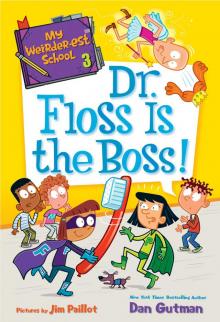 My Weirder-est School #3
My Weirder-est School #3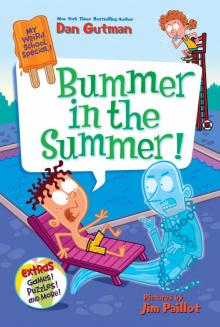 Bummer in the Summer!
Bummer in the Summer!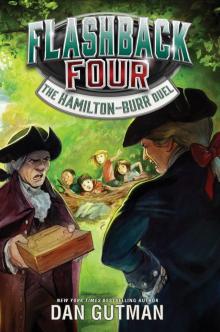 Flashback Four #4
Flashback Four #4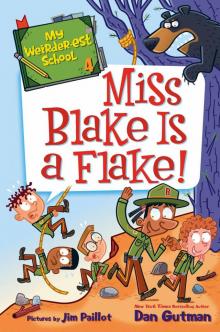 Miss Blake Is a Flake!
Miss Blake Is a Flake!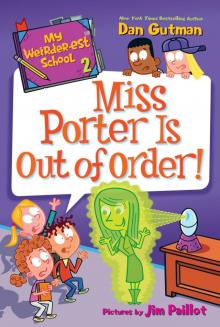 My Weirder-est School #2
My Weirder-est School #2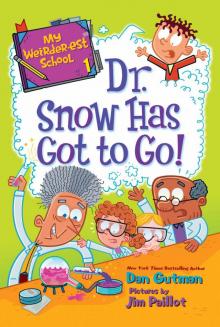 My Weirder-est School #1
My Weirder-est School #1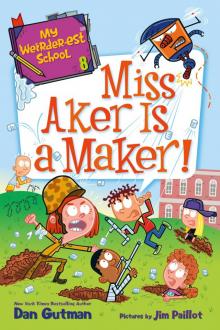 Miss Aker Is a Maker!
Miss Aker Is a Maker!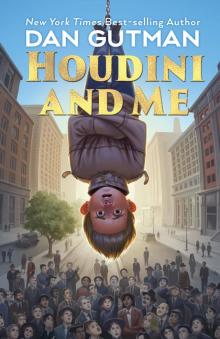 Houdini and Me
Houdini and Me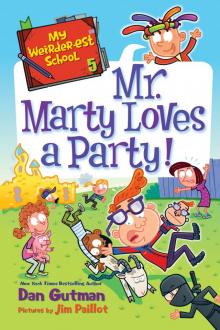 Mr. Marty Loves a Party!
Mr. Marty Loves a Party! Ms. Jo-Jo Is a Yo-Yo!
Ms. Jo-Jo Is a Yo-Yo!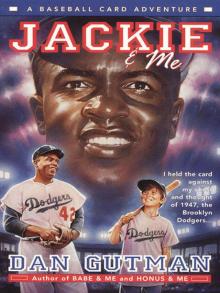 Jackie & Me
Jackie & Me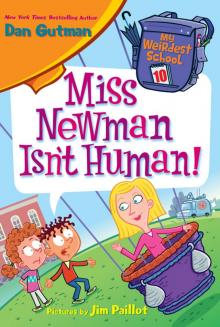 Miss Newman Isn't Human!
Miss Newman Isn't Human!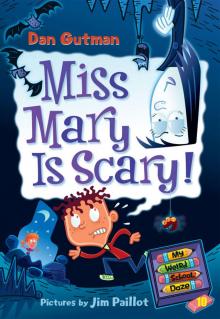 Miss Mary Is Scary!
Miss Mary Is Scary!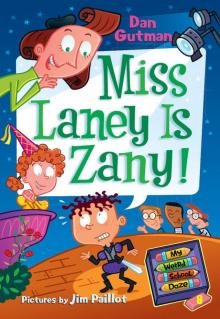 Miss Laney Is Zany!
Miss Laney Is Zany!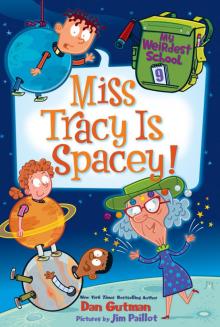 Miss Tracy Is Spacey!
Miss Tracy Is Spacey!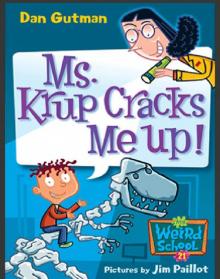 Ms. Krup Cracks Me Up!
Ms. Krup Cracks Me Up!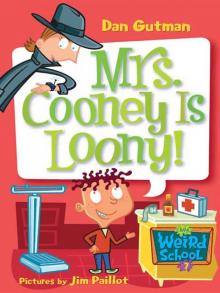 Mrs. Cooney Is Loony!
Mrs. Cooney Is Loony!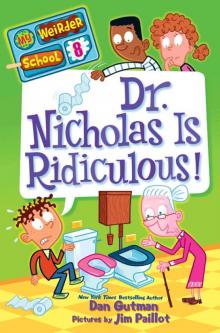 Dr. Nicholas Is Ridiculous!
Dr. Nicholas Is Ridiculous! My Weird School Special
My Weird School Special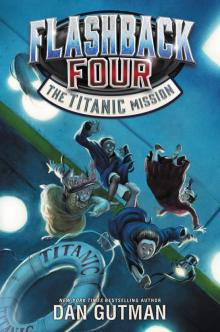 The Titanic Mission
The Titanic Mission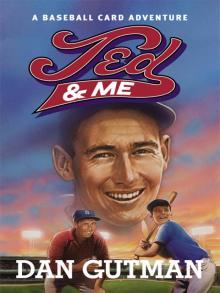 Ted & Me
Ted & Me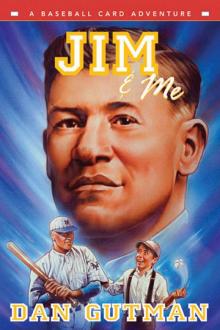 Jim & Me
Jim & Me Miss Child Has Gone Wild!
Miss Child Has Gone Wild! The Talent Show
The Talent Show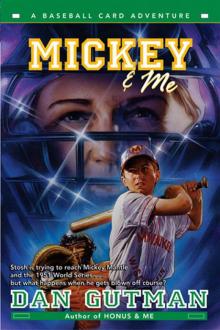 Mickey & Me
Mickey & Me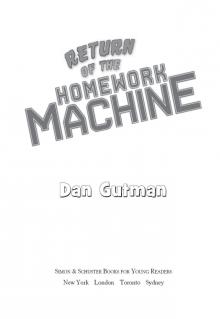 Return of the Homework Machine
Return of the Homework Machine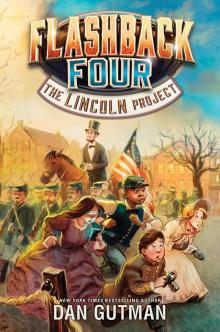 The Lincoln Project
The Lincoln Project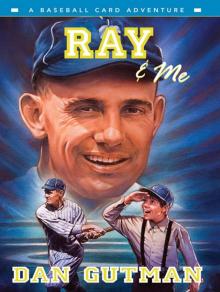 Ray & Me
Ray & Me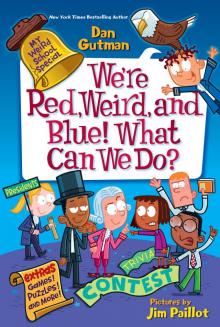 We're Red, Weird, and Blue! What Can We Do?
We're Red, Weird, and Blue! What Can We Do? The Get Rich Quick Club
The Get Rich Quick Club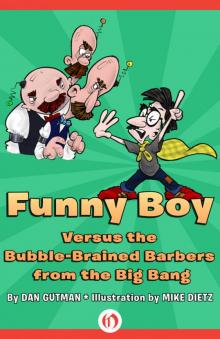 Funny Boy Versus the Bubble-Brained Barbers from the Big Bang
Funny Boy Versus the Bubble-Brained Barbers from the Big Bang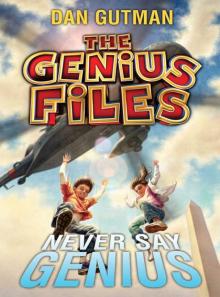 Never Say Genius
Never Say Genius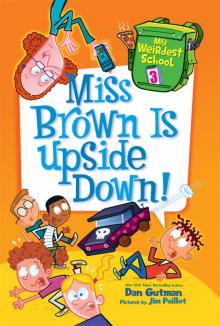 Miss Brown Is Upside Down!
Miss Brown Is Upside Down!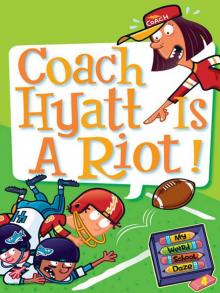 Coach Hyatt Is a Riot!
Coach Hyatt Is a Riot!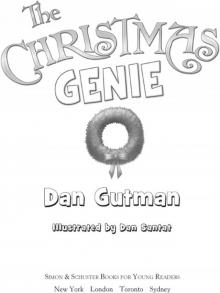 The Christmas Genie
The Christmas Genie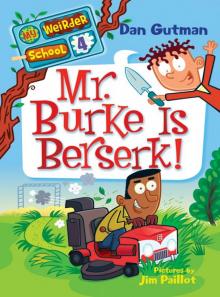 Mr. Burke Is Berserk!
Mr. Burke Is Berserk!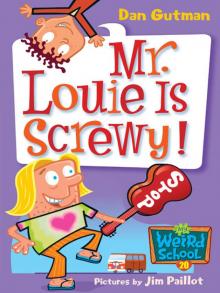 Mr. Louie Is Screwy!
Mr. Louie Is Screwy!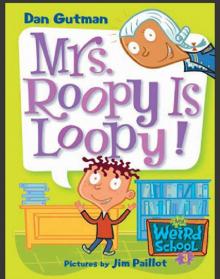 Mrs. Roopy Is Loopy!
Mrs. Roopy Is Loopy!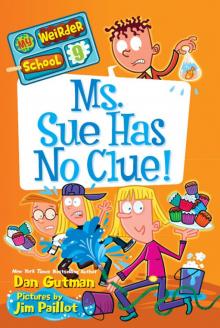 Ms. Sue Has No Clue!
Ms. Sue Has No Clue!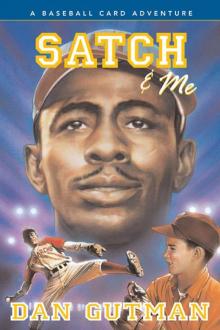 Satch & Me
Satch & Me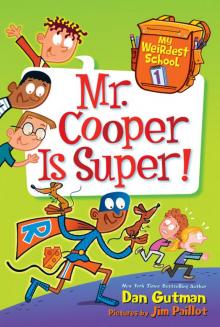 Mr. Cooper Is Super!
Mr. Cooper Is Super!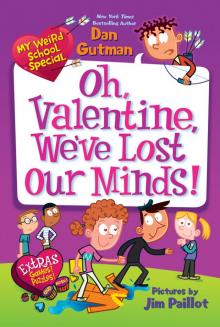 Oh, Valentine, We've Lost Our Minds!
Oh, Valentine, We've Lost Our Minds!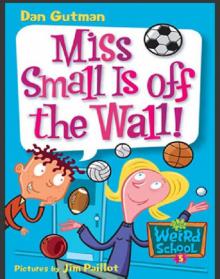 Miss Small Is off the Wall!
Miss Small Is off the Wall!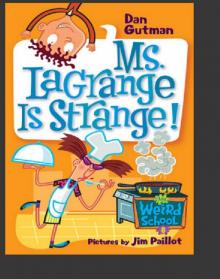 Ms. LaGrange Is Strange!
Ms. LaGrange Is Strange!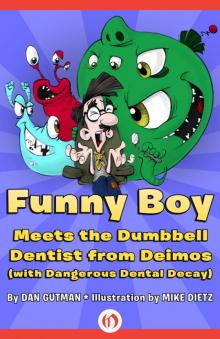 Funny Boy Meets the Dumbbell Dentist from Deimos (with Dangerous Dental Decay)
Funny Boy Meets the Dumbbell Dentist from Deimos (with Dangerous Dental Decay)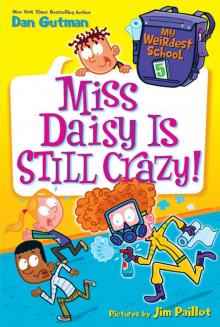 Miss Daisy Is Still Crazy!
Miss Daisy Is Still Crazy!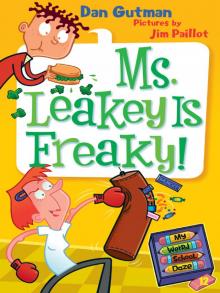 Ms. Leakey Is Freaky!
Ms. Leakey Is Freaky!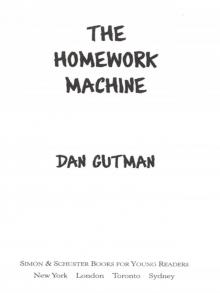 The Homework Machine
The Homework Machine Miss Holly Is Too Jolly!
Miss Holly Is Too Jolly!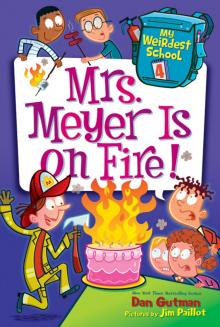 Mrs. Meyer Is on Fire!
Mrs. Meyer Is on Fire!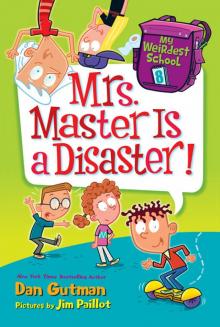 Mrs. Master Is a Disaster!
Mrs. Master Is a Disaster!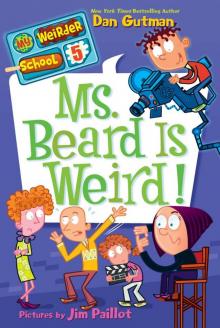 Ms. Beard Is Weird!
Ms. Beard Is Weird!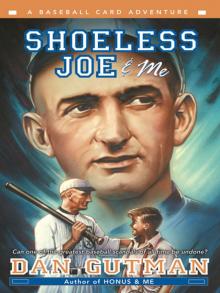 Shoeless Joe & Me
Shoeless Joe & Me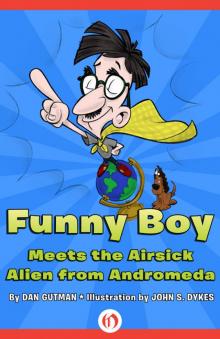 Funny Boy Meets the Airsick Alien from Andromeda
Funny Boy Meets the Airsick Alien from Andromeda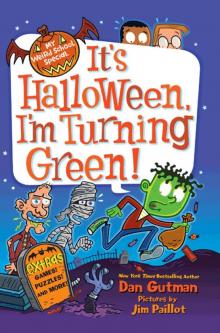 My Weird School Special: It’s Halloween, I’m Turning Green!
My Weird School Special: It’s Halloween, I’m Turning Green!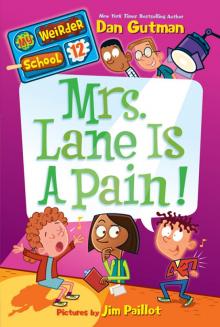 Mrs. Lane Is a Pain!
Mrs. Lane Is a Pain!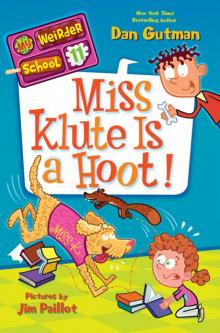 Miss Klute Is a Hoot!
Miss Klute Is a Hoot!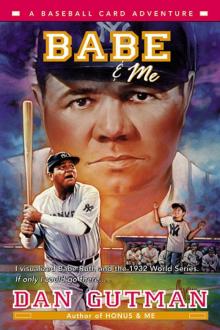 Babe & Me
Babe & Me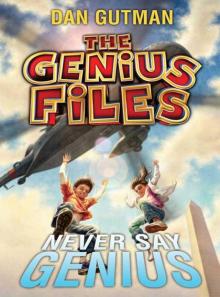 The Genius Files 2 Never Say Genius
The Genius Files 2 Never Say Genius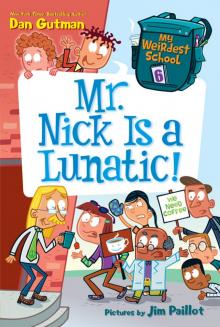 Mr. Nick Is a Lunatic!
Mr. Nick Is a Lunatic!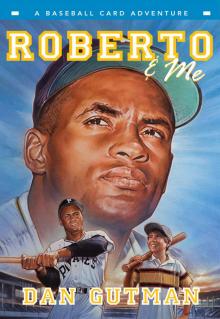 Roberto & Me
Roberto & Me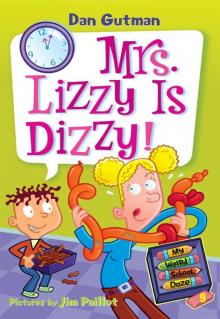 Mrs. Lizzy Is Dizzy!
Mrs. Lizzy Is Dizzy!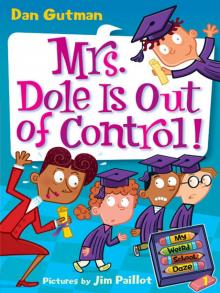 Mrs. Dole Is Out of Control!
Mrs. Dole Is Out of Control!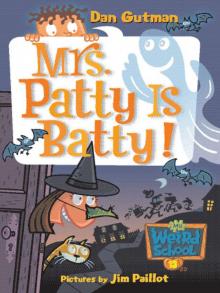 Mrs. Patty Is Batty!
Mrs. Patty Is Batty!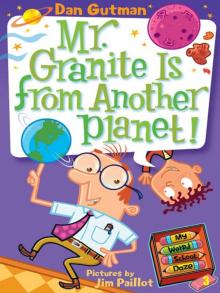 Mr. Granite Is from Another Planet!
Mr. Granite Is from Another Planet!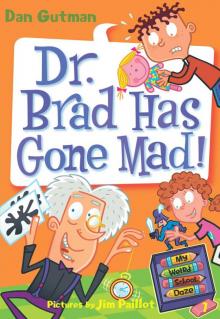 Dr. Brad Has Gone Mad!
Dr. Brad Has Gone Mad!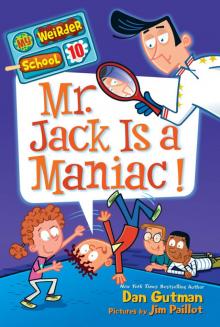 Mr. Jack Is a Maniac!
Mr. Jack Is a Maniac!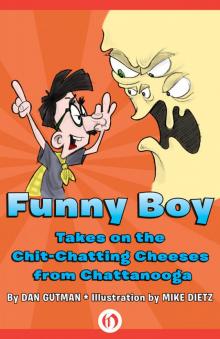 Funny Boy Takes on the Chit-Chatting Cheeses from Chattanooga
Funny Boy Takes on the Chit-Chatting Cheeses from Chattanooga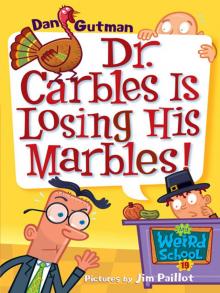 Dr. Carbles Is Losing His Marbles!
Dr. Carbles Is Losing His Marbles!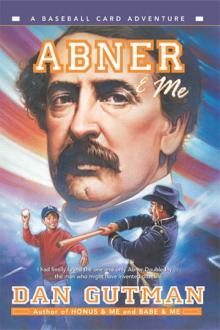 Abner & Me
Abner & Me Ms. Hannah Is Bananas!
Ms. Hannah Is Bananas!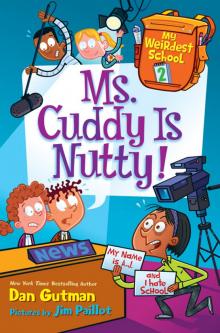 My Weirdest School #2
My Weirdest School #2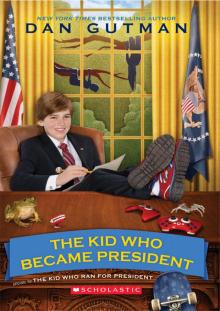 The Kid Who Became President
The Kid Who Became President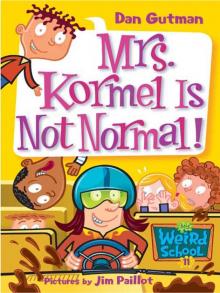 Mrs. Kormel Is Not Normal!
Mrs. Kormel Is Not Normal!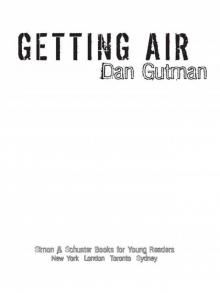 Getting Air
Getting Air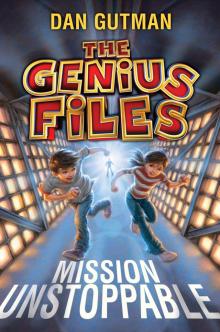 Mission Unstoppable
Mission Unstoppable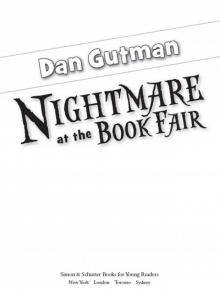 Nightmare at the Book Fair
Nightmare at the Book Fair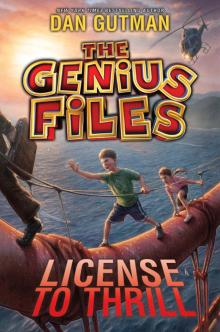 License to Thrill
License to Thrill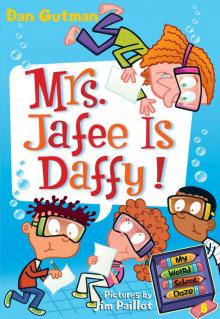 Mrs. Jafee Is Daffy!
Mrs. Jafee Is Daffy!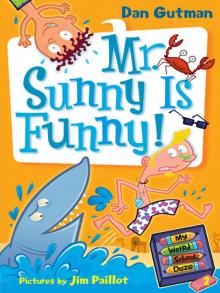 Mr. Sunny Is Funny!
Mr. Sunny Is Funny!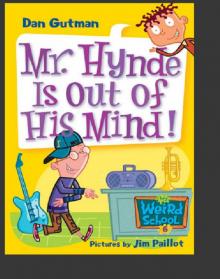 Mr. Hynde Is Out of His Mind!
Mr. Hynde Is Out of His Mind!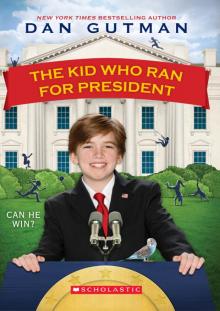 The Kid Who Ran For President
The Kid Who Ran For President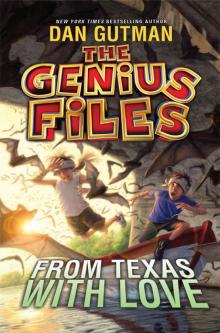 The Genius Files #4
The Genius Files #4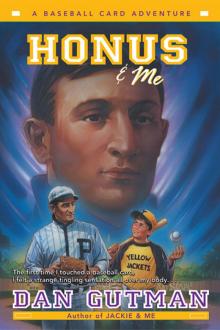 Honus & Me
Honus & Me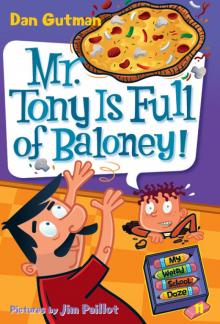 Mr. Tony Is Full of Baloney!
Mr. Tony Is Full of Baloney!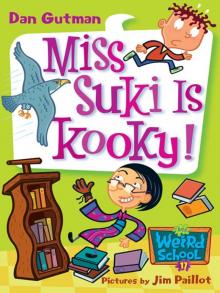 Miss Suki Is Kooky!
Miss Suki Is Kooky!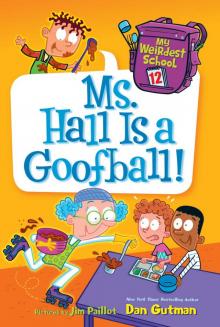 Ms. Hall Is a Goofball!
Ms. Hall Is a Goofball!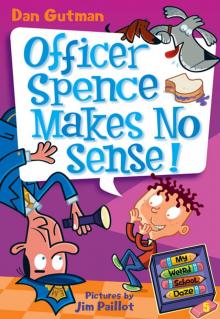 Officer Spence Makes No Sense
Officer Spence Makes No Sense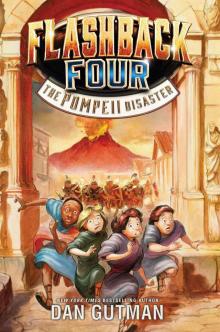 The Pompeii Disaster
The Pompeii Disaster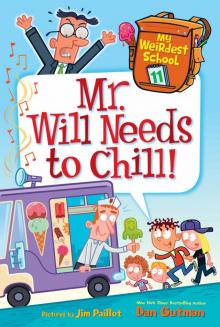 Mr. Will Needs to Chill!
Mr. Will Needs to Chill!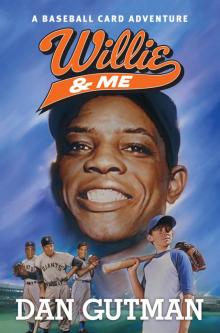 Willie & Me
Willie & Me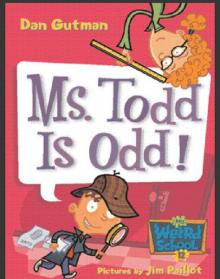 Ms. Todd Is Odd!
Ms. Todd Is Odd!